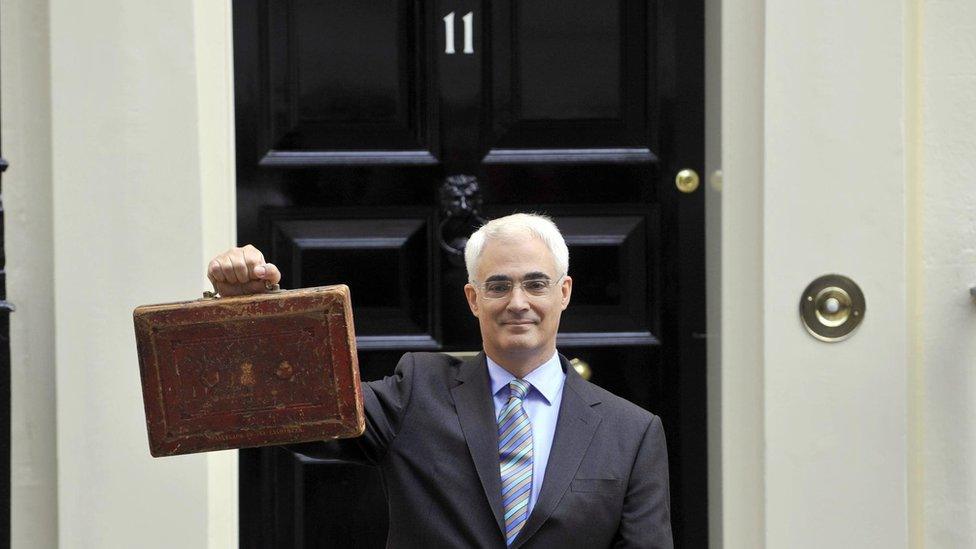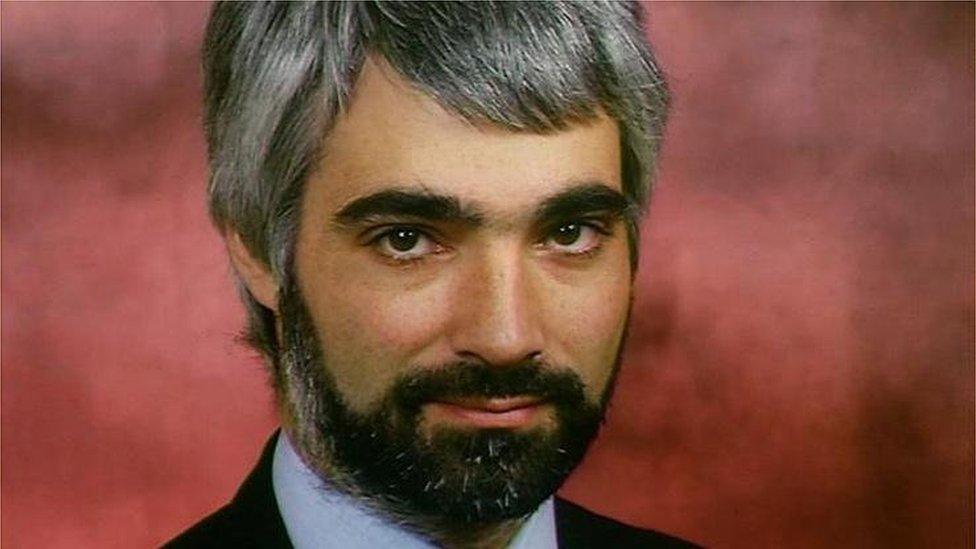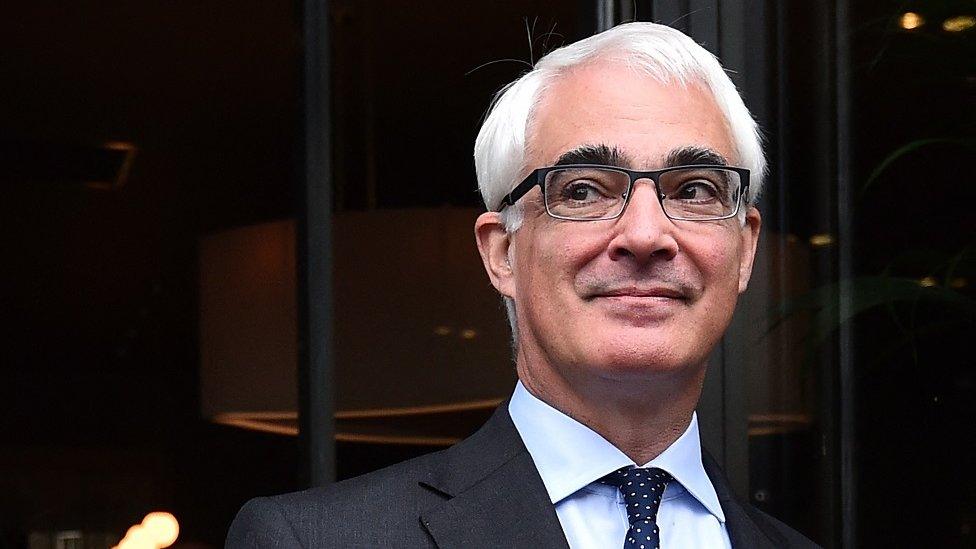Alistair Darling: Steady hand in an economic crisis
- Published

As a radical student, Alistair Darling hoped to reshape the world.
As chancellor, he found himself at the centre of global crisis steering the UK's troubled banks back from the brink during the 2008 financial crash.
He served at the heart of New Labour, with 13 years in Tony Blair and Gordon Brown's cabinets.
He once said he hoped to be remembered as "the minister who began to eradicate poverty", but he will go down in history for the actions he took as chancellor in 2008.
His were the steady pair of hands who shepherded the British economy through the near collapse of half its banking system. He was best known for having to nationalise Northern Rock at first, and then effectively the bulk of British banking amid runs on banks by the public and financial markets.
Alistair Darling tells of Gordon Brown's time as prime minister in his new book
He began his memoir of his period at Number 11 with the phrase "I don't believe in panicking until it's absolutely necessary".
It was a doctrine that was sorely tested as faced financial chaos unseen in Britain for decades.
Born in London, Alistair Darling attended the fee-paying Loretto School near Edinburgh. His friends said Mr Darling did not enjoy life at the severe private school, and his experiences influenced his shift to left-wing politics.
His old history teacher was shocked to see a grown-up Mr Darling speaking aggressively in interviews as Chancellor.
This was a "very quiet" boy who "played his cards close to his chest" at school, Peter Lapping told the BBC back in 2008.
Radical student
He did his legal training in the city before representing it in local government and ultimately in Parliament.
While Mr Darling had the air of a mild-mannered, non-confrontational Scottish lawyer, his political origins were actually somewhat more lively.
As a student activist in Aberdeen, he was associated with far-left policies and reportedly distributed "Marxist" leaflets at railway stations.
But after being elected as an MP in 1987, he left left-wing roots behind and his image was transformed from firebrand to moderate. Mr Darling became closely linked with efforts to modernise Labour.

Alistair Darling was elected to Parliament in 1987
In opposition, he served on the front bench in several roles, including as home affairs spokesman.
Ahead of the 1997 election, he also toured the boardrooms of the big City firms, to reassure them of New Labour's intentions.
Following the party's landslide election win, Mr Darling served as chief secretary to the Treasury, putting in place wide-ranging reforms to financial regulation.
He then replaced Harriet Harman as social security secretary - later re-named work and pensions secretary - delivering Labour's welfare reforms and taking responsibility for spending a third of the government's budget.
Mr Darling said he would like to be remembered as "the minister who began to eradicate poverty", but he was targeted by pensioners outraged when their pensions were raised by only 75p.
The episode led to a rebellion at Labour's conference in 2000, opposition coming from Labour giant Barbara Castle.
Mr Darling, said to have a knack for mastering complex briefs in record time, was parachuted into another "trouble" job in 2002, when Stephen Byers resigned as transport secretary amid the collapse of Railtrack.
EU referendum: Alistair Darling denies 'Project Fear'
To gauge how he was doing in top jobs, Mr Darling said he would apply the "Tesco test" - watching how people would react to him when he was out shopping.
"If they look away, you are in trouble," he wrote in his memoir.
"If they engage with you, either through eye contact or, even better, conversation, then you are in with a chance."
Throughout his cabinet career, Mr Darling achieved the seemingly impossible of being close to Gordon Brown and not estranged from Tony Blair.
When his long-time political ally, Mr Brown, moved to 10 Downing Street in June 2007, Mr Darling, the quiet man of the cabinet, replaced him as chancellor.
Many thought he would be a "yes" man, cowering in the shadow of his powerful boss.
But he staked out his independence when, in the summer of 2008 - and not long before the collapse of Lehman Brothers - he warned of the worst financial crisis in 60 years.
One of his biggest clues a looming financial crisis came in the shape of a "gift-wrapped panettone" hand delivered by Sir Fred Goodwin, chief executive of RBS, appeared at his doorstep over Christmas 2007.
"He would not admit it, but I sensed that RBS, which until that time had seemed invincible, its directors and senior staff exuding confidence verging on arrogance, was in more trouble than we had thought," Lord Darling wrote.
Election defeat
The financial crash resulted in a backlash from those close to Gordon Brown, with Mr Darling later remarking that the "forces of hell" had been unleashed on him.
He eventually fell out with his neighbour and boss over the need for spending cuts after the significant increase in government borrowing during the financial crisis.
That disagreement, Lord Darling believes, was what led to Labour's 2010 general election defeat.
During the brief interregnum after the 2010 election, on a journey to Brussels, he privately acknowledged the game was up, and expressed little surprise at the Liberal Democrats handing David Cameron a stable five-year majority.
After Labour lost power, Alistair Darling returned to the backbenches. But he took a central role in the Better Together campaign, which campaigned for a "No" vote in the 2014 referendum on Scottish independence.
He made a significant contribution although he reluctantly took on the role, and felt bruised by the schisms in Scottish society during a brutal campaign. But he joined back up with Gordon Brown, and ultimately played a vital role in keeping the union together.
He was created Lord Darling of Roulanish, in 2015 but retired from the House of Lords in 2020. He was married to Margaret, and had two children, Calum and Anna.
Related topics
- Published30 November 2023
